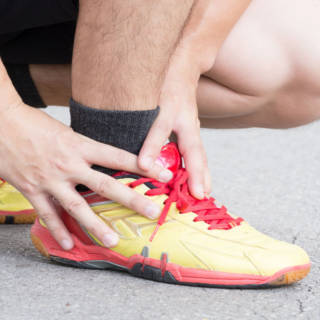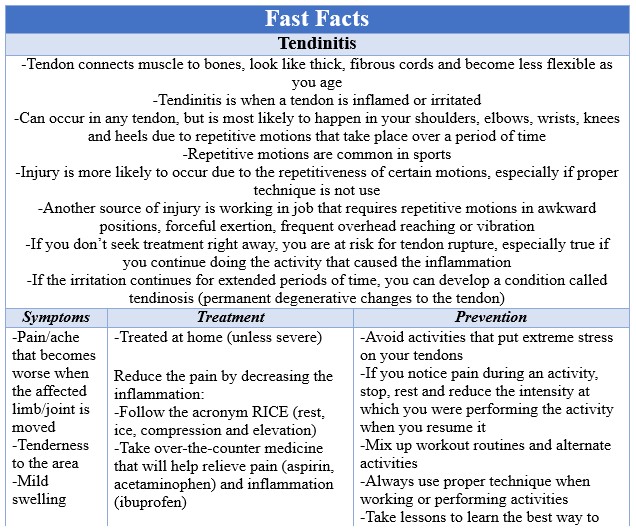What is going on with your body?
You might have heard of tennis elbow, swimmer’s shoulder or jumper’s knee, but did you know that they are all caused by same thing—inflammation of a tendon. What is a tendon? How does it become inflamed? What can you do to prevent any of these conditions from happening?
 Definition
Definition
A tendon is what connects your muscle to your bones. They look like thick, fibrous cords and, as we age, they become less flexible. Tendinitis is when a tendon is inflamed or irritated. This can occur in any tendon, but is most likely to happen in your shoulders, elbows, wrists, knees and heels due to repetitive motions that take place over a period of time. These types of repetitive motions are common in sports and injury is more likely to occur due to the repetitiveness of certain motions, especially if proper technique is not use. This is why most people associate certain types of tendon injuries with a particular sport, like tennis elbow or swimmer’s shoulder. Another possible source of injury is working in job that requires repetitive motions in awkward positions, forceful exertion, frequent overhead reaching or vibration. If you don’t seek treatment right away, you are at risk for tendon rupture. This is especially true if you continue doing the activity that caused the inflammation. If the irritation continues for extended periods of time, you can develop a condition called tendinosis. This is when there are permanent degenerative changes to the tendon. Symptoms usually include pain/ache that becomes worse when the affected limb/joint is moved, tenderness to the area and mild swelling.
Treatment
Most cases of tendinitis can be treated at home. The key is to reduce the pain by decreasing the inflammation. The best way to do this is by following the acronym RICE, which stands for rest, ice, compression and elevation. Rest means don’t continue doing the activity that caused the injury or doing anything else that causes the affected area to hurt. While it is important to rest the affected area, it is key not to remain completely bedridden because your body can become stiff and your risk of blood clots increases the more you are inactive. So, maintain some level of activity for the rest of your body and after the first few days of full rest for your injured body part, be sure to gently move it through its full range of motion (this will help to maintain flexibility). Ice is particularly important in reducing swelling which helps to decrease muscle spasms and pain. So, you want to apply it for 20 minutes at a time, several times a day. Be sure not to put ice or ice packs directly on your skin since this could damage your skin. Compression is when you use wraps or compressive bandages to help reduce the swelling to the area. This will help to prevent loss of motion to the injured joint. Elevation means to keep the affected area at or above the level of your heart as this also helps to reduce swelling. Besides following RICE, you can take over-the-counter medicine that will help relieve pain (aspirin, acetaminophen) and inflammation (ibuprofen). Sometimes, your doctor may recommend corticosteroid injections or platelet-rich plasma (PRP) injections (involves taking a sample of your blood, separating out the platelets and other healing factors and then injecting them into the affected area).
Prevention
There are several things that you can do to prevent tendinitis from happening. It is important to avoid activities that put extreme stress on your tendons, so if you notice pain during an activity, stop, rest and reduce the intensity at which you were performing the activity when you resume it. If you notice that you are having pain every time you do a particular activity, try mixing it up and alternating it with a different activity. It is essential to do any activity with proper technique, this is why taking lessons can be helpful because you learn the best way to perform an activity which will reduce your chance of injury. Two other key things are taking the time to stretch to increase your range of motion and doing strengthening exercises that will help your muscles withstand the stress placed upon them. It is also important to practice good ergonomics when working and in other situations in order to prevent undue stress on your muscles and tendons that can last for extended periods of time.
Tendinitis can very quickly stop your ability to enjoy your favorite activity. By taking the steps to prevent it from occurring, you’ll be able to participate while remaining healthy. If you have any questions or concerns, please speak with your doctor. If you would like more information, please visit the Medline Plus’s Tendinitis page at https://medlineplus.gov/tendinitis.html